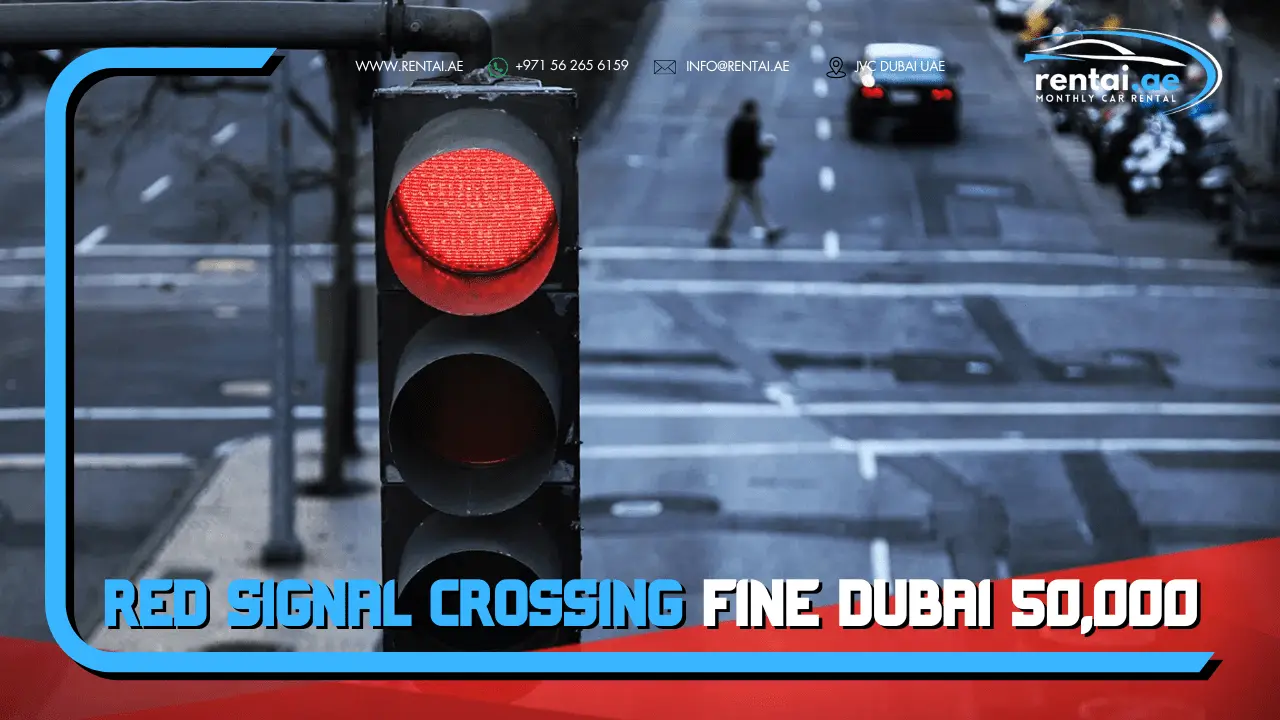
Red Signal Crossing Fine Dubai 50,000 in 2025
In recent years, Dubai has implemented stringent traffic laws to enhance road safety and reduce accidents. One of the most significant changes has been the introduction of hefty fines for serious traffic violations, including running red lights. The Dh50,000 fine for red signal crossing has garnered significant attention and sparked discussions among residents and visitors alike. This article aims to provide a comprehensive overview of this fine, its implementation, and its impact on driving behavior in Dubai.
The Dh50,000 Fine: Myth vs. Reality
The notion of a Dh50,000 fine for running a red light in Dubai has caused considerable confusion and concern among drivers. However, it’s crucial to understand the nuances of this penalty:
Standard Red Light Violation: The basic fine for crossing a red signal without causing an accident remains Dh1,000. This is accompanied by 12 black points on the driver’s license and a 30-day vehicle impoundment.
Severe Violations: The Dh50,000 fine is reserved for more serious cases, such as:
- Running a red light and causing an accident
- Reckless driving resulting in a red light violation
- Repeated offenses
It’s important to note that the Dh50,000 fine is not automatically applied to every red light violation. It serves as a maximum penalty for the most serious cases, often involving accidents or repeat offenders. The exact breakdown of the Dh50,000 fine in severe cases is not publicly detailed, as it likely varies based on the specific circumstances of each incident. Factors such as the severity of any resulting accident, the driver’s history of violations, and the discretion of law enforcement officials may all play a role in determining the final penalty.
Breakdown of Penalties
When a driver runs a red light in Dubai, they typically face the following consequences:
- Monetary Fine: Dh1,000
- Black Points: 12 points added to the driver’s license
- Vehicle Impoundment: 30 days
However, drivers have options regarding the impoundment:
- Pay Dh3,000 to avoid impoundment altogether
- Opt for “smart impoundment” at home for Dh500 (Dh100 per day for 30 days)
The total cost, therefore, can range from Dh1,000 (basic fine) to Dh4,000 (fine + avoiding impoundment), depending on the driver’s choice.
Implementation and Enforcement
Dubai’s traffic authorities use a combination of advanced technologies and human oversight to enforce red light violations:
Camera Systems: Most intersections in Dubai are equipped with sophisticated camera systems that capture vehicles crossing red lights.
Flash Detection: Many drivers report seeing a flash when crossing an intersection, which often indicates that a violation has been recorded.
Police Discretion: In some cases, police officers may use their judgment to determine the severity of the violation and whether it warrants a higher fine.
Impact on Driving Behavior
The introduction of severe penalties for red light violations has had a significant impact on driving behavior in Dubai:
Increased Caution: Drivers are more cautious when approaching intersections, especially when the light is about to change.
Reduced Violations: The threat of hefty fines and impoundment has led to a decrease in red light violations.
Awareness Campaigns: The Dubai Police and Road and Transport Authority (RTA) have conducted extensive awareness campaigns to educate drivers about the consequences of running red lights.
Controversies and Criticisms
While the strict penalties aim to improve road safety, they have not been without controversy:
Excessive Punishment: Some argue that the potential Dh50,000 fine is disproportionate, especially for first-time offenders or minor infractions.
Economic Impact: The high fines and impoundment costs can be financially devastating for many residents, particularly those in lower-income brackets.
Inconsistent Application: There have been concerns about the consistency in applying the maximum fine, with calls for clearer guidelines on when the Dh50,000 penalty should be imposed.
Comparison with Other Emirates
It’s worth noting that traffic laws and fines can vary between emirates in the UAE. For instance, Abu Dhabi has similar penalties for red light violations, including the potential for a Dh50,000 fine in severe cases. However, the implementation and specific circumstances may differ slightly from Dubai.
Tips for Drivers
To avoid red light violations and potential fines, drivers in Dubai should:
- Approach intersections with caution, especially when the light is yellow
- Be aware of camera locations at major intersections
- Avoid distractions while driving, particularly near traffic signals
- Familiarize themselves with the traffic laws and potential penalties
Future Outlook
As Dubai continues to evolve its traffic management systems, we may see further refinements to the red light violation penalties:
Smart City Integration: With Dubai’s push towards becoming a smart city, we might see more advanced traffic monitoring systems that can provide more nuanced assessments of violations.
Educational Approaches: There may be an increased focus on driver education and rehabilitation programs as alternatives to purely punitive measures.
Fine Adjustments: The authorities might consider adjusting the fine structure based on data collected on its effectiveness in reducing violations.
Conclusion
The Dh50,000 fine for red light violations in Dubai serves as a stark reminder of the emirate’s commitment to road safety. While the maximum penalty is reserved for the most serious cases, the standard fine of Dh1,000 plus impoundment and black points remains a significant deterrent for most drivers. As Dubai continues to grow and develop, its traffic laws will likely evolve to balance safety concerns with fairness and practicality.
Ultimately, the best way for drivers to avoid these hefty fines is to adhere strictly to traffic rules, remain vigilant at intersections, and prioritize safety over haste. By fostering a culture of responsible driving, Dubai aims to create safer roads for all residents and visitors, reducing accidents and saving lives in the process.

